9 Brain Habits You Didn’t Realize You Had…
Brain is certainly the most amazing part of human body. It becomes more interesting when it does not work the way you expect it should. Psychology frequently establishes our intuitions about how human mind works, but it reveals a number of surprises as well…
Although some psychology students will have heard one or two of these before, here’s a list of brain habits you probably didn’t realize you had:
1) The maximum capacity of your short-term memory is seven.
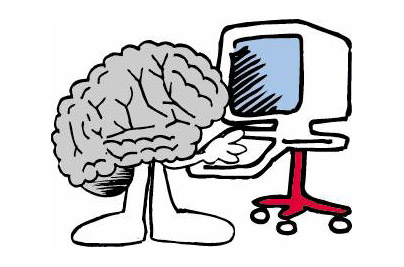
Humans have basically three forms of memory: Sensory, Long-term and Short-term. Long-term memory is just like hard-drive space. Similarly, Short-term memory functions like a very small RAM. This Short-term memory is capable to hold only about five to nine (seven is an average) items at a time.
Retrieving information longer than this will need you to either pack it together into seven units or store it in Long-term memory. Have you observed that the most phone numbers have only seven digits?
2) The most visible color is Chartreuse.

Yellowish green, chartreuse, is naturally placed right in the middle of the frequencies of visible light. Human eyes have receptors for green, blue and red colors. Being placed in the middle, chartreuse actuates the most of these receptors to fire, making it distinct and easier to spot. For the same reason, in some metropolises, firetrucks have been modified from red to a yellowish green color to make them more visible and obvious to the eye.
3) Subconscious is smarter than you.
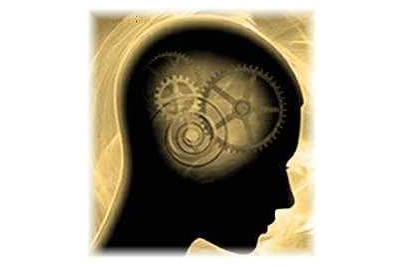
Subconscious is smarter than you. In other words, it is more powerful. In a recent study, a square was attributed to a location on a computer screen through a complex pattern. After watching it out, people began to get results better than the chance of recognizing where the square would crop up next. However, when they were inquired to consciously find out the pattern, even given a few hours, nobody really did it!
4) There are two nervous systems.
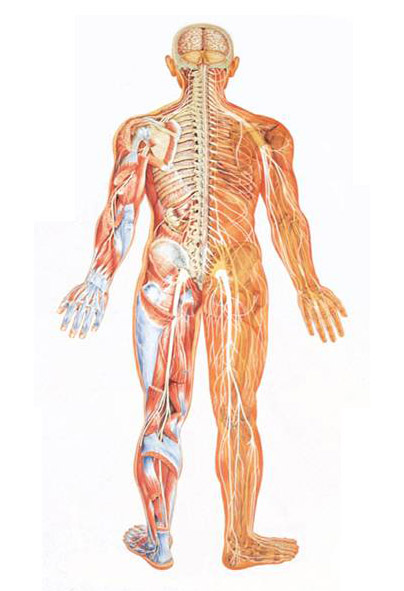
We have two sets of nervous systems. One controls excitation, while the other controls inhibition. If you hold out your hand, you might observe minor tremors. This is actually stimulated by slight, random differences in the amount each of the two systems are firing.
5) Brain is exceptionally bad at probability.
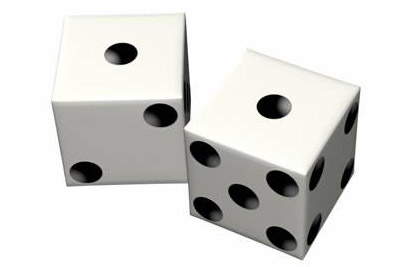
Your high-school math teacher might have told you about this one. Here what’s interesting isn’t that your brain is bad at probability. But how? In one study, recipients were asked:
Jessica is 31 years old, single, candid, and very promising. She graduated in philosophy. As a student, she was anxious about discrimination issues and social justice, and also took part in anti-nuclear demonstrations.
Assign a rank to the following statements from most probable to least probable: Jessica is a teacher in an elementary school.
- Jessica works in a bookstore and takes Yoga classes.
- Jessica is active in the feminist movement.
- Jessica is a psychiatric social worker.
- Jessica is a member of the League of Women Voters.
- Jessica is a bank teller.
- Jessica is an insurance salesperson.
- Jessica is a bank teller and is active in the feminist movement.
Nearly 90% of students responded that #7 was more probable than #5. This is despite the fact that to be a bank teller and in the feminist movement is entirely contained within the set of #5 (just being a bank teller). It is observable that our minds like to think more details make events more probable, not less.
6) Memory isn’t great either.

Research has revealed that people are highly probable to misremember past events. Even worse, it is quite easy to suggest a memory that never happened. Due to this fact, so-called “repressed” memories should be given a lot of consideration. It is extremely easier to suggest a memory of a situation that never encountered, than it is to recover one that actually did.
7) Depth is perceivable with one eye.
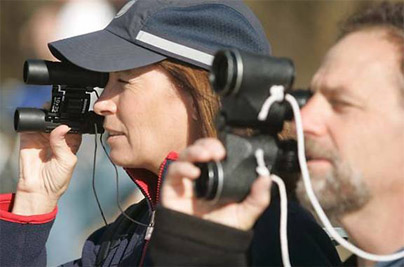
It’s not quite true that depth perception is totally the result of having two eyes. Binocular vision does help in making a three-dimensional image. Still, most of your capability to perceive depth comes from inside your brain. It has been wired to look at angles and proportions to measure distance.
If you needed two eyes to perceive depth, then most optical illusions wouldn’t work and it would be extremely difficult to gather information from two-dimensional images. Not to mention a great number of one-eyed pirates walking overboard.
8 ) Long-term memory closes up during sleep.

The components of the brain that carry information to Long-term memory turn off while sleeping. For the same reason, dreams quickly fade out after you wake up. Although you may have quite a few dreams in a night, they aren’t being memorialized into Long-term memory. Normally only the fragments of a dream left in Short-term memory have a possibility to be converted after you wake up.
9) The Brain has an amazing instant playback feature.

The last form of memory, i.e. Sensory memory is actually your brain’s equivalent to an instant playback feature. Functioning for both your vision and hearing, your thalamus can resend signals a few seconds after they were originally sent.
Let’s suppose being at a party and overhearing someone call your name. Often you can recall what they said even if you were concentrating on another conversation. This is because your sensory memory re-sends the signals when it feels something important, such as your name. If you missed this form of memory, activities such as multitasking or taking notes from a speaker would not be practicable for you.
If you’re supposed to repeat something you just said because the other person wasn’t hearing, just wait for a few seconds. Often they can replay the message in their head and cause to a reaction.
















October 2nd, 2008 at 4:46 pm
Awesome post! seriously i didn’t think about any of the above listed things.
Great Blog BTW.
October 10th, 2008 at 11:27 am
‘Subconscious is smarter than you’
.. please tell me something i don’t know.
October 10th, 2008 at 11:28 am
Mr_Costello: I hear ya.
Has anyone read Blink: The Power of Thinking Without Thinking? It’s very interesting, and it supports the idea that the subconscious is smarter than our socially-raped consciousness. I’m paraphrasing, and adding a little “me” in there.
October 19th, 2008 at 2:01 am
With the colour, are there any studies done showing it to be the most noticeable colour?
I wouldn’t have assumed so, since the eye works (afaik) with opponent colour cells (on/off ganglions). This means that mixing colours doesn’t necessarily give more input.
See opponent colour theory. (http://en.wikipedia.org/wiki/Opponent_process)
October 19th, 2008 at 2:05 am
very interesting
October 19th, 2008 at 2:06 am
@JaetheFirst: I love that book! So cool.
Very nice article! I definitely didn’t know almost all of these. Interesting too. Great blog =D
October 19th, 2008 at 2:08 am
I read parts of Blink. It was very interesting, I have been in sales all of my adult life, and I have always been very successful. I don’t know if a person can be taught, or if they are just born with the ability to, as they call it in the book “thin slicing”. I have been doing this ever since I can remember and I didn’t know it. I now know why I was so successful in sales.
October 19th, 2008 at 2:21 am
One controls excitation, while the other controls inhibition.
Uhh, that’s a very bad way to put it. As far as any biology or psych class I’ve taken classifies the two main nerve transmission systems are the sympathetic and parasympathetic systems. One controls normal tasks, and the other controls pain/reflex/emergency and stops at the brain stem, leading to faster reflex. That’s why there are a few people who absolutely can’t feel pain. They feel normal touch, but when nerves sense a problem the sympathetic system is broken and the signal is lost.
Muscle tremor is primarily a function of your brain trying to regulate incredibly precise ion levels in muscle cells to make your muscles behave, that’s why tremor becomes worse and worse as you hold a position, and why properly using several muscles in concert with each other (see how to use the left arm in shooting) can balance tremors. The same ion balance problems cause cramps and other problems when muscles are pushed hard and salt levels become unstable.
October 19th, 2008 at 2:40 am
Ooops, forgot to mention the 2nd problem with #3
Smarter is a relative term, as there are different types of intelligence. Also, the sub-conscious is always working and helping the “active” conscious when we try to solve problems.
October 19th, 2008 at 3:20 am
I love it. Now I don’t feel so bad when I can’t remember everything I did yesterday. Thought it had to do with my wild college days. Great post!
October 19th, 2008 at 3:38 am
Nice post!
October 19th, 2008 at 4:22 am
Great post!
I especially like #9, it seems obvious but I’ve never really thought about it. #5 is interesting, “It is observable that our minds like to think more details make events more probable, not less,” and absolutely true. #2 was also interesting, I’ve always thought red was the most noticeable color, but the more I look at it, I have to agree with you.
October 19th, 2008 at 5:20 am
very interesting,i like it, i saw a clip on the tv about your brain, on pbs and found that your brain is an amazing muscle,and that if you learn somthing new everyday your brain will keep learnng,but if you dont your brain begins to loose what you learned before,you can also can the brain you have ,and become smarter and live longer by taking care of your brain. and by looking at your brain a doctor can tell what youve been doing with it,but even if you damage it it will repair itself , so you dont have to live with the brain you were born with,
October 19th, 2008 at 6:36 am
This is some great information you have shared here! Emailing and adding to my bookmarks for sure!
October 19th, 2008 at 6:54 am
amazing post! added to del.icio.us and stumbleupon!
Thanks a lot!
October 19th, 2008 at 7:20 am
Want to enhance your IQ, there is a new proven way to do it. This post says that the limit on short term memory is 7 but there are ways around that. New studies in neuroplasticity show that your brain can grow just like any other muscle in your body. All it requires is dedicated exercise.
October 19th, 2008 at 7:27 am
I forgot what the first two were.
October 19th, 2008 at 10:11 am
good article..
forwarded this link to all my friends.. i like the subconscious & sensory memory..
October 19th, 2008 at 10:26 am
i heard that sub conscious mind comes active at some times.. is there any way that we can bring that out..
1) i heard fasting makes it active.. is that true??
October 19th, 2008 at 12:38 pm
I absolutely love this article! Try to remember one time you woke up saying “i had a dream last night, it was about…”. Got it? What was the dream about?
Try to remember one time you woke up saying “i had a dream last night, it was about…”. Got it? What was the dream about?
Some of the habits can be tested on the spot:
7) “Depth is perceivable with one eye.” – cover one of your eyes and look around the room, outside… you can still tell depth.
GTG! Again, great article!
October 19th, 2008 at 4:48 pm
I disagree with the authors statement concerning #5, if I am reading it correctly……Given her profile, choice #7 is more probable than choice # 5 since #5 only has her being a bank teller, and #7 includes her being active in the feminist movement, which is more consistent with her given profile of concerns (“As a student, she was anxious about discrimination issues and social justice, and also took part in anti-nuclear demonstrations.”) Choice # 5 omits any of these concerns, making it a less probable choice since she is concerned about issues, rather than being apathetic……..I think the author misspoke in this case….
Overall, I pretty much agree with the other habits described, and found this list to be a compelling piece…….thanks
October 19th, 2008 at 9:22 pm
freddiebones: There’s no mathematical way, with any information, that 7 is more probable than 5. If 7 is true, then 5 is ALSO true.
If it can be asserted (which it can’t) that she has a 100% chance to be active in the feminist movement, then 7 and 5 are equally likely, because the second half of case 7 is irrelevant, and is true in case 5 as well.
Even if you try to assert that she has to be a feminist (which you can’t) there’s a higher chance of her being a feminist (case F) than an ACTIVE feminist (case AF) as case 7 states, because if case AF is true, case F has to be true as well.
October 20th, 2008 at 4:32 am
Some years back I took an intro to Psychology class and was told that blue is the easiest color to see. Has this changed?
October 20th, 2008 at 12:17 pm
maybe I’m crazy, but I always consider my subconscious mind to be many times more powerful than my conscious mind and completely separate usually.
And by powerful, I mean it has a different form of memory (unrecoverable consciously, exist in long term memory but still unrecoverable)
and I think the subconscious mind has the same effect as the double nervous system, but instead of inhibitions and excitement its more along the lines of instinctual reactions and conscious reactions.
And i dont think its entirely true that your long term memory shuts off while sleeping. Perhaps that area of your brain is less active electrically and thats what the study they did was based on, but i can remember plenty of dreams, im not saying every single one but what was everyone’s worst nightmare? i bet you can remember that.
October 20th, 2008 at 5:03 pm
The first point is actually inaccurate. The capacity of short term memory is 7 plus or minus two, so 9 would be the ‘maximum’ capacity of STM. This is not true either though, because there are variations between people. Furthermore people can manipulate the way they process information in order to process more information. We group things into chunks. Otherwise we wouldn’t be able to function. For example, we can read sentences that are longer than seven words.
And i really don’t know where you got that two nervous systems thing. I mean, maybe you’re thinking of the sympathetic vs. parasympatheic systems, but that still doesn’t really make sense. Neurons function in both an excitatory and an inhibitory way and these systems are deeply interconnected.
October 20th, 2008 at 9:26 pm
“Assign a rank to the following statements from most probable to least probable: Jessica is a teacher in an elementary school.”
sorry… is that supposed to be one of the options?
October 20th, 2008 at 9:51 pm
Your long term memory does not close up during sleep, sorry, you lose.
October 20th, 2008 at 10:52 pm
Why didn’t I remember all the funky facts and other crap they made me memorize for TV interviews? Why did I blank out? Just because I never read anything (other than People magazine and the National Enquirer) doesn’t mean I’m dumb. I have talents. I can walk like a runway model, I can play the flute enough to be in my high school’s marching band and I am an absolute pro at being the meanest bitch in America!
I want to take America back—-to the 19th century. I love John because he’s sooooo old and kinda sickly, don’tcha know? So I WILL get to be president and then I’m gonna invade that country i can see from my front porch with 40x binoculars and while standing on the sofa.
October 21st, 2008 at 12:36 am
don’t buy “blink”, it was boring and a re-hash of old science channel information.
October 21st, 2008 at 2:55 am
I never heard of that yellowish green color before. Interesting article.
October 21st, 2008 at 2:55 am
This website, like many of them, is taken to be truth. Yet is it? As a professor of psychology, I would have a different opinion. As example; perhaps the yellow/green is more visible (it is) but we are consciously trained to observe red as a sign of emergency. Hence it takes top spot as a visible color. We observe it more closely. In commercial buildings, blue is the most noticeable color–the blue of the Morpho butterfly, to be exact. just coming close to that color in a commercial building will guarantee a glance. It is one of the least appearing colors in nature, and the one to most cause us to take notice. In nature, yellow green is fairly common.
Ahhh, the thinking mind always agrees with what is in print. Maybe you should read my articles. . .
October 21st, 2008 at 5:00 am
Photoshopped
October 21st, 2008 at 5:08 am
Right,
7 digit phone numbers because that’s all that can easily be remembered.
Do people just believe anything written in these things?
October 21st, 2008 at 12:50 pm
the subconscious is not smarter than you.
because the subconscious is a part of you. it is an illusion to think that you are your consciousness and your consciousness alone. it is just that certain kinds of information, such as this example of pattern recognition does not reach your consciousness. you must not see the consciousness and the subconsciousness as 2 devided things. your brain is made of alot of different mechanisms, and some of them are percieved conscousnessly.
October 21st, 2008 at 1:29 pm
#2 doesn’t make sense. Like the other person said, colors are determined through comparing across the different types of cones. Since that chartreuse color is between green and yellow, there would be more overlap in response of the green and red cones, whose maximal absorbencies are ~533 (green) and ~564 (yellow) nm respectively. Since their so close there’s a lot of ambiguity in response. To me it looks like that color is pretty close to where red and green respond equally.
I just learned this in my neuro class, but I know some of this is right, but someone correct me if I’m wrong, but that’s my honest thought on #2.
and with #5, when you add two possibilities the probability always goes down. like if you have 1/2 a chance of picking a blue ball from a bag and 1/2 a chance of picking a red ball from the same bag, what is the probability of picking both a red and blue ball. It’s 1/2*1/2= 1/4.
Correct me if I’m wrong on that one too… The last math I have was Calc II two years ago.
October 21st, 2008 at 2:23 pm
I have invented an energy protocol that can identify and begin the reversal process of TBI (Traumatic Brain Injury). I have spoken with the US Army about this method and once I am done with the PhD study of my NeuroConnecting method, I will present this to the upper brass and create a team of thousands of soldiers who can address and reverse TBI in the field as well as back home. I don’t have a website up for those who are curious about this information, but at least I have posted my email for further contact. I have been successful with issues as severe as a Closed Brain Injury and as “minor” as a softball smash into the face. Restabilizing the brain which has had some form of impact injury is phenomenally powerful and capable of reenabling the brain to reclaim “lost” function.
October 21st, 2008 at 3:06 pm
#5: “It is observable that our minds like to think more details make events more probable, not less.”
I don’t think this is true.
When you’re given a set of options, you instantly make assumptions to weigh everything up.
So even though the options were -
5) Jessica is a bank teller.
7) Jessica is a bank teller and is active in the feminist movement.
The brain can read this(, sometimes incorrectly,) as -
7) Jessica is a bank teller and is active in the feminist movement.
5) Jessica is a bank teller [and is not active in the feminist movement].
Because its wired to evaluate distinct options, instead of nested probabilities – which serve very little purpose in making a decision.
Other than that, I’d say its an interesting and well-illustrated article.
October 21st, 2008 at 3:54 pm
Problem with any “brain” information is that scientists just don’t know that much about the brain STILL. Much of what is out there is purely speculation.
It is amazing though how easily fooled the brain is, in our advanced physiology classes we spent a few labs doing experiments that “fool” the nervous system, cool stuff.
October 21st, 2008 at 4:30 pm
in re to question by Marc Donis; thanks, thats what i wanted to know!
October 21st, 2008 at 6:35 pm
That was so amazing I can only remember about 4 or 5 while I’m typing this.
October 21st, 2008 at 8:00 pm
This is malarkey.
“Short-term memory is capable to hold only about five to nine (seven is an average) items at a time… Have you observed that the most phone numbers have only seven digits?”
Phone numbers do not have 7 digits because the brain can remember 7 digits more easily, it’s because at the time they figured that was the best tradeoff of ease of memory and having enough numbers to accomodate future growth. In Europe, the phone numbers have 9 digits so this theory is invalid.
Also, if this were true, memorising one phone number would take up your entire short term memory, which is not the case. If you needed to remember the area code as well you’d be hooped.
October 22nd, 2008 at 5:23 am
Very interesting, enjoyed the post.
October 22nd, 2008 at 11:00 am
Interesting facts!! I never knew that subconsious is smarter.
October 22nd, 2008 at 12:56 pm
so, that’s how my brain used to work at .. hihi
October 22nd, 2008 at 8:34 pm
great post!
…. exactly what is it about? sorry my long term memory is short today.
October 22nd, 2008 at 9:45 pm
Uh, as far as #5 is concerned, the reason people are incredibly stupid is because they blatantly tell you she is a school teacher right after the colon before the list starts. That automatically negates all answers except 2 and 4 if you can safely make the assumption that she only has one job, which I am doing. Every other answer involves a profession/career, which makes them wrong in light of the fact that she is a school teacher, so you’ve narrowed the list down to two people. We aren’t bad at probability, but we are bad at paying attention to details that are relevant.
You could go on about how she could be a school teacher and a psychiatric social worker on the side or vice versa. You can do that with every answer, which is why I feel safe making the assumption that she is strictly a school teacher because that is what they tell me.
My argument is completely moot though if the people that created this page accidentally forgot to make a #8 and that the school teacher thing was just another probability instead of a given fact in the problem.
October 23rd, 2008 at 11:33 am
Nice word ‘Chartreuse’.
October 23rd, 2008 at 11:39 am
El color que mejor percibimos es el… amarillo verdoso (¿verde fosfi?)…
Y otras particularidades de como funciona nuestro cerebro….
October 23rd, 2008 at 11:52 am
This is an awesome post. Found the part on ‘chartreuse’ quite true. In fact, I was staring for a long time at that picture (to that chartreuse strip) for some obscure reason.
October 23rd, 2008 at 4:35 pm
Well I knew I could perceive depth with one eye and I’ve even juggled with one eye closed for a few seconds also I noticed whenever I mishear someone and I ask to repeat it I understand what they said a second or two later. The others are really cool to know.